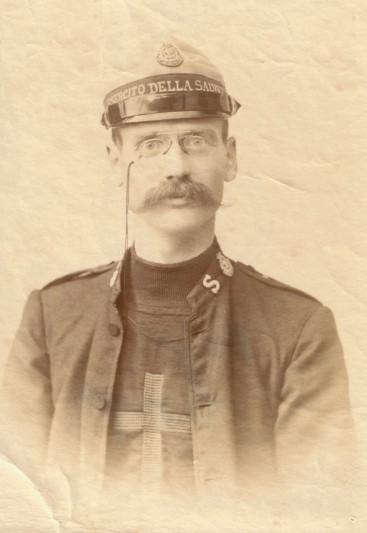Richard Greville Thonger (b.1861) was working as a pharmacist in Birmingham in the spring of 1882 when he attended a meeting at The Salvation Army’s Regent Hall on London’s Oxford Street, where ‘the Spirit of God took hold of my soul’ and he immediately joined The Salvation Army. He soon entered ‘Officer’ training and was commissioned as an ordained minister. He was appointed to join the first group of Officers to arrive in Switzerland, where the earliest meetings were held in the Casino Hall in Geneva in December 1882. Thonger was transferred to France in 1884, where he met and married Lieutenant Evodie Philit, also an ‘Officer’ or minister in The Salvation Army. They commanded The Salvation Army in Italy from 1893, returning to Britain in 1895 to take up a position at the London headquarters, but eventually resigned their commissions as Officers. However, Thonger and his wife remained Salvationists, as we know he was the Sergeant Major of a Salvation Army ‘corps’ in Paris in 1932. They had seven children (one of whom, Lucie, also became a Salvation Army Officer) and both died in the 1940s.
Lieutenant Thonger’s 340-page diary, referred to in French on its title page as a 'journal intime’ but otherwise written in English, is a daily record from June to December 1883 and covers Thonger’s appointments at Geneva, Chambéry (in France) and Rolle. The Salvation Army’s campaign in Switzerland met opposition from the local authorities as well as from popular sentiment, and worship was severely restricted. The campaign was led by Catherine Booth (the daughter of the founders of The Salvation Army and known as ‘The Maréchale’) who was expelled from Switzerland in the spring of 1883 and banned from returning. The journal reflects this atmosphere with a description of an attack by ‘an immense crowd’ on a house where Thonger was conducting a meeting and an account of the funeral of Charles Wyssa which led to the arrest of The Maréchale. Wyssa was an 18 year old, described as ‘the firstborn of the Swiss war, and our first Swiss comrade in Heaven’, who had died of tuberculosis. The Maréchale returned to Switzerland to conduct Wyssa's funeral in September, was arrested and spent 12 days in Neuchâtel prison. The journal also covers Thonger’s own imprisonment for 19 days at the Chateau de Rolle, ‘because two or three of my converts had sold two or three hymn books without a colporteur’s license’. The diary ends with Thonger reflecting on the anniversary of ‘the first battle at the Casino’.
The journal complements other records relating to Thonger already held by The Salvation Army Heritage Centre, including photographs, a few letters and a typescript memoir of his experiences in Switzerland which was only identified as a result of our acquiring the journal.
One of the last entries in this journal refers to a previous journal for December 1882; however the whereabouts of any of Thonger's other journals is unknown and we have no information on the provenance of this volume, as it was acquired by the seller as part of a miscellaneous lot at auction. We are grateful to the Friends of the National Libraries for enabling us to add it to our collection of historical records.
